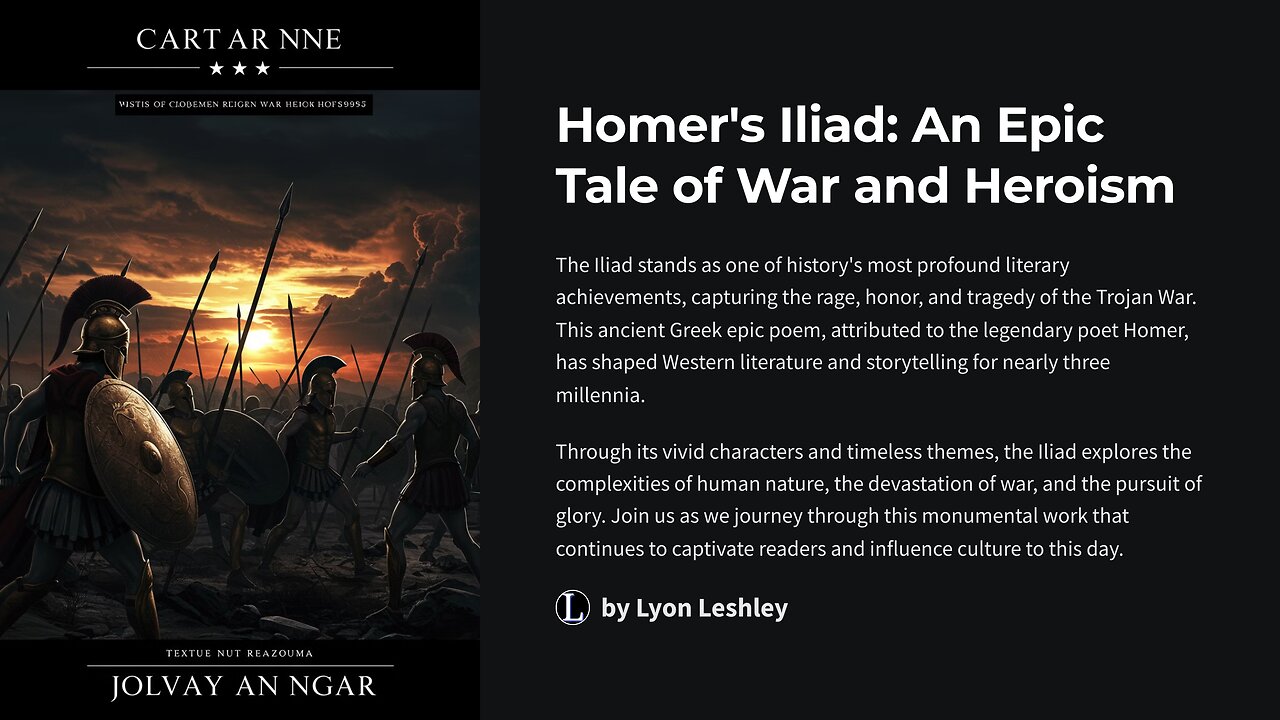Premium Only Content

Iliad: An Epic Tale of War and Heroism
Welcome, scholars and enthusiasts of literature, to our exploration of one of antiquity's most significant treasures, Homer's Iliad. This epic poem transcends the mere recounting of events; it delves into the very essence of human nature. The Iliad is not simply a tale of war; rather, it is a profound meditation on themes that remain relevant to modern humanity: rage, honor, fate, and the timeless quest for significance amid chaos.
The setting of the Iliad is the legendary Trojan War, a protracted conflict fueled not only by desire and ambition but also by the whims of divine beings whose interventions add layers of complexity to the narrative. The war is sparked by a quarrel among the gods, leading to the abduction of Helen, wife of Menelaus, and igniting a conflict that would embroil nations and heroes alike. Yet, while the backdrop of war is essential, it is the emotional and psychological struggles of the characters that command our attention and engage our empathy.
At the heart of this epic is Achilles, the archetypal hero whose journey and internal conflict are emblematic of the human condition. Achilles embodies the duality of human existence—the desire for personal glory conflicts with the communal needs of his people. His rage, which ignites the narrative, is not just a response to the loss of his honor, but also a pathway through which we witness the devastating consequences of pride and vindictiveness. Achilles' withdrawal from battle, fueled by his anger toward Agamemnon, sets in motion a series of events that lead to profound loss and suffering. Here, Homer invites us to reflect on the nature of heroism: What does it mean to be a hero? Is it merely the pursuit of glory, or must one also consider the implications of their actions on others?
-
 50:45
50:45
Redacted News
1 hour agoNick Fuentes & Tucker Carlson DESTROY Ben Shapiro, Cuomo collapses to a socialist | Redacted
10.5K32 -
 LIVE
LIVE
Dr Disrespect
6 hours ago🔴LIVE - DR DISRESPECT - BATTLEFIELD 6 - REDSEC - 10 WINS CHALLENGE
3,162 watching -
 LIVE
LIVE
Akademiks
2 hours agoAdin Ross x 6ix9ine x Akademiks stream
693 watching -
 LIVE
LIVE
StoneMountain64
4 hours agoBattlefield REDSEC HARDCORE, Ultra Movement, and CRAZY Portal Games
121 watching -
 1:09:44
1:09:44
Russell Brand
6 hours agoFrom Curb Your Enthusiasm to Courage — Cheryl Hines on Hollywood, RFK Jr. & Speaking Out - SF646
124K22 -
 1:30:26
1:30:26
The Quartering
4 hours agoWoke Is Back!
117K47 -
 1:18:21
1:18:21
DeVory Darkins
5 hours agoTrump issues CHILLING WARNING to GOP as SCOTUS hears arguments regarding Tariffs
108K100 -
 3:35:48
3:35:48
Barry Cunningham
6 hours agoBREAKING NEWS: PRESIDENT TRUMP SPEECH AT THE MIAMI BUSINESS FORUM! (MIKE JOHNSON PRESSER)
99K22 -
 2:04:47
2:04:47
The Charlie Kirk Show
6 hours agoOnward | Henderson, Laurie, Miles | 11.5.2025
106K26 -
 2:15:52
2:15:52
Steven Crowder
9 hours agoWho is the Real Myron Gaines | Ash Wednesday
351K467